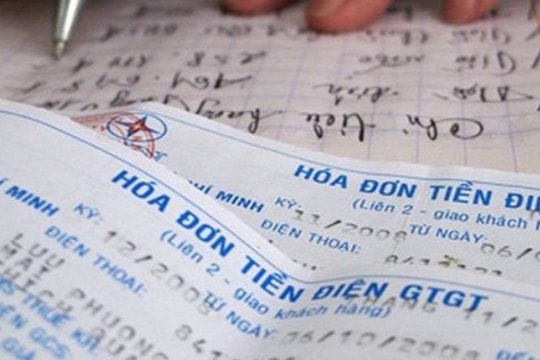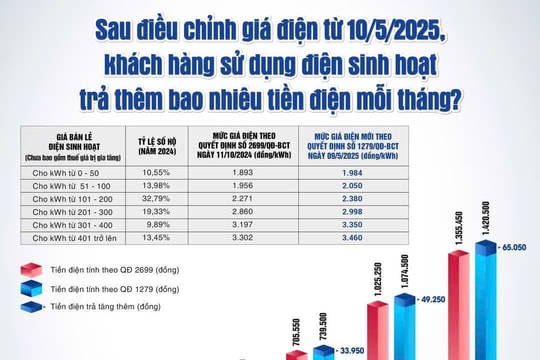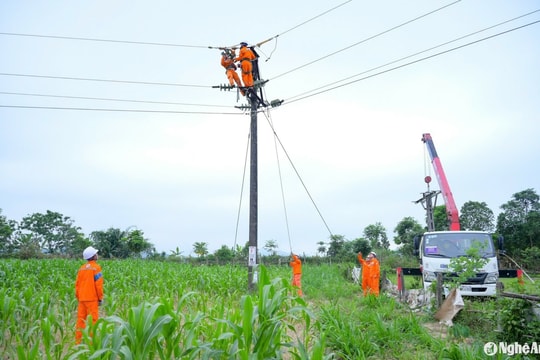In 2 days, tenants will not have to pay sky-high electricity bills from their landlord.
In just 2 days, millions of tenants and boarders will no longer have to pay electricity bills 2-3 times higher than the retail electricity price regulated by the State from landlords. That is good news for millions of tenants who are currently struggling to pay from landlords.
 |
| Bien Hoa Electricity, Dong Nai staff instruct customers on how to calculate new electricity bills. |
On October 26, Circular 25/2018/TT-BCT of the Ministry of Industry and Trade amending and supplementing a number of articles of the previous Circular No. 16, regulating the implementation of electricity prices will officially take effect. This is considered a new policy to help those who rent houses significantly reduce their electricity costs.
Electricity prices are too different
Currently in Ho Chi Minh City, the average electricity price at boarding houses is about 3,500 - 4,500 VND/kWh, in Hanoi it is 4,000 - 5,000 VND/kWh; other cities such as Can Tho, Da Nang are also from 3,000 - 3,500 VND/kWh. This electricity price is collected by the landlord of the house or room, including electricity plus losses, lighting costs and shared use.
“My husband and I use about 150kWh of electricity each month, the landlady charges 4,000 VND/kWh, which is 600,000 VND. Meanwhile, if I were charged the normal electricity price, it would only cost me more than 270,000 VND,” said Mr. Le Tinh (31 years old, living in Dinh Cong Ward, Hoang Mai District, Hanoi).
Similarly, Mr. Nguyen Dinh Son (34 years old, renting a house in District 12, Ho Chi Minh City) and his wife said: "My family uses 1 refrigerator, 2 fans, 1 TV, 3 energy-saving lamps, 1 rice cooker, 1 laptop, but every month it consumes 200 - 250kWh. With the electricity price paid to the landlord of 3,500 VND/kWh, every month we pay 700,000 - 875,000 VND".
 Tenants have to pay electricity bills much higher than the current retail price of electricity. |
The electricity price that tenants like Mr. Tinh and Mr. Son have to pay is very common. This price is much higher than the retail price of household electricity according to regulations.
Specifically, the retail price of household electricity is currently divided into 6 levels. Level 1: from 0 - 50kWh, customers pay 1,549 VND/kWh; Level 2: from 51 - 100kWh pay 1,600 VND/kWh; Level 3: from 101 - 200kWh pay 1,858 VND/kWh; Level 4: from 201 -300kWh pay 2,340; Level 5: from 301 - 400kWh pay 2,615 VND/kWh; Level 6: from 401kWh and above pay 2,701 VND/kWh. This means that the higher the amount of electricity consumed, the higher the selling price will be for each level.
How to calculate electricity bill?
ReplyPVRegarding the new points of Circular 25, the representative of Vietnam Electricity Group (EVN) said that first of all, it is to amend "the case of renting houses to students and workers (the tenant is not a household).
Accordingly, if the house is rented for less than 12 months and the landlord fails to fully declare the number of people applying the electricity usage quota, the retail electricity price according to the 3rd step will be applied (Step 3: for kWh from 101 - 200, the retail price is 1,858 VND/kWh + VAT) for the entire electricity output measured at the meter. In case the tenant has a house rental contract for 12 months or more and has a temporary residence registration, the landlord will directly sign the electricity purchase contract or the tenant's representative will sign the electricity purchase contract (with the landlord's commitment to pay the electricity bill) and pay the electricity bill like a normal household customer.
In particular, for boarding houses with many tenants but not in the same family, there is still a new calculation method that is considered beneficial for both tenants and landlords. In this case, the landlord needs to fully declare the number of people using electricity, then the electricity seller is responsible for providing the quota to the landlord based on the temporary residence confirmation document.
Every 4 people are counted as one household using electricity. This also means that 1 person is counted as ¼ of the standard, 2 people are counted as ½ of the standard, 3 people are counted as ¾ of the standard.
 The new way of calculating electricity bills according to Circular 25 will benefit tenants and landlords. |
For example, a landlord has 3 rooms for rent, with 10 tenants, and is given a quota for 2.5 households. Suppose the total monthly electricity consumption of the whole boarding house is 550 kwh. The electricity bill that the landlord must pay will be calculated as follows: The first 125kwh (level 1): 50 kwh x 2.5 households x 1,549 VND/kwh = 193,625 VND; The next 125kwh (level 2): 50 kwh x 2.5 households x 1,600 VND/kwh = 200,000 VND; The next 250kwh (level 3): 100 kwh x 2.5 households x 1,858 VND/kwh = 464,500 VND; Next 50kwh (level 4): 50 kwh x 2,340 VND/kwh = 117,000 VND. Total = 975,125 VND + VAT is 1,072,637 VND.
For example, for a tenant with 4 people/room (equivalent to 1 household), consuming 250kWh/month. The calculation will be: 50kWh in the range of 0 - 50kWh (level 1) x 1,549 VND/kWh = 77,450 VND; The next 50kWh in the range of 51 - 100kWh (level 2) x 1,600 VND/kWh = 80,000 VND; The next 100kWh in the range of 101 - 200kWh (level 3) x 1,858 VND/kWh = 185,800; The next 50kWh in the range of 201 - 300kWh (level 4) x 2,340 VND/kWh = 117,000 VND. The total amount of rent paid to the landlord for this room is 460,250 + VAT = 506,275 VND for 250kWh.
This calculation method benefits both the tenant and the landlord. Because if the landlord only calculates one total meter (1 rate), the amount of electricity calculated at the high rate will be large and the cost will be high. If the landlord declares the number of people to be calculated according to many rates, the amount of electricity will be allocated and calculated from low to high according to each rate.
Worry about "escalating" rent prices
Mr. Nguyen Anh Tuan, Director of the Electricity Regulatory Authority, affirmed: "With Circular 25, tenants are entitled to enjoy electricity prices at the correct level prescribed by the State."
However, in reality, tenants are receiving the new electricity price regulations with some reservations. Landlords are also having to calculate to avoid being disadvantaged.
Ms. Tran Thuy My (living in Binh Tan District, Ho Chi Minh City) said: "I just heard that the electricity price is about to decrease, but before I could be happy, yesterday, the landlord announced that the room rent will increase by 300,000 VND/month, the reason is to compensate for the electricity bill which will be reduced from 4,000 VND from October 26. Everyone in the boarding house is shocked and doesn't know what to do."
Currently, Ms. My has to pay 2.2 million VND per month for her room and 600,000 - 700,000 VND per month for electricity. Even if the application of Circular 25 helps her reduce the electricity price by half according to the regulated price, but the room price increases by 300,000 VND, it means she has not benefited at all.
To make Circular 25 effective, both the Ministry of Industry and Trade and EVN are currently directing the Departments of Industry and Trade and the Electricity Corporations to disseminate the new points of Circular 25 and widely post them on the media.
According to EVN, as of September 30, 2018, EVN has inspected over 177,000 boarding houses and signed a commitment to collect electricity bills at the correct price with 157,000 boarding house owners. When Circular 25 takes effect, EVN will continue to review and coordinate with state management agencies to inspect and punish cases of illegal collection.
Additional sanctions Clause 6, Article 1 of Circular 25 has added the handling of cases where the landlord incorrectly declares the number of tenants or when the tenant has moved out but the landlord does not declare to enjoy a larger household electricity usage quota than the actual one. In that case, the electricity seller has the right to request compensation and impose a penalty for breach of contract according to the provisions of Circular No. 27/2013/TT-BCT dated October 31, 2013 of the Ministry of Industry and Trade regulating the inspection of electricity activities and electricity use, and resolving disputes over electricity purchase and sale contracts. |








